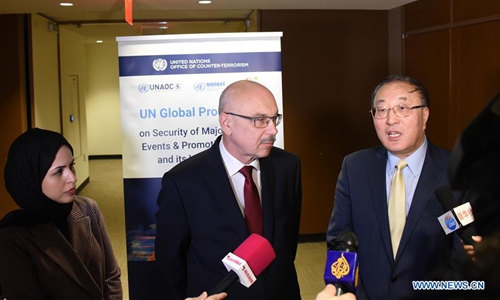HOME >> CHINA
China attaches great importance to security of Beijing Winter Olympics: envoy
Source:Xinhua Published: 2020/2/4 10:45:42

Zhang Jun (R), China's Permanent Representative to the United Nations, Vladimir Voronkov (C), undersecretary-general of the UN Office of Counter-Terrorism (UNOCT), and Alya bint Ahmed Al Thani, permanent representative of Qatar to UN, speak to journalists at the UN headquarters in New York, Feb. 3, 2020. China's UN envoy on Monday said the Chinese government attaches great importance to the security of the Beijing Winter Olympic Games in 2022. Zhang Jun made the remarks at the UN's launch of "Global Programme on Security of Major Sporting Events, and Promotion of Sport and Its Values as a Tool to Prevent Violent Extremism." (Xinhua/Wang Jiangang)
China's UN envoy said Monday the Chinese government attaches great importance to the security of the Beijing Winter Olympic Games in 2022.
China's Permanent Representative to the UN Zhang Jun made the remarks at the UN's launch of "Global Programme on Security of Major Sporting Events, and Promotion of Sport and Its Values as a Tool to Prevent Violent Extremism."
Zhang said the Chinese government started as early as 2015 relevant security preparations, as requested by the International Olympic Committee, and the Olympic venues under construction have been placed under the security system.
"We will establish a security center, a command and control center and an intelligence center, as well as interactive mechanisms among different sites hosting the games to ensure a safe, smoothly run and successful Winter Olympics," he said.
On the significance of sports events, the Chinese diplomat maintained that sports events have provided athletes of different countries, nationalities, cultures and skin colors with an important platform to enhance mutual understanding, increase people-to-people exchanges, and foster social integration.
Sporting events also attract more young people to the cause of sports, drive economy and trade, and make their positive contribution to world peace and development, he added.
On counterterrorism efforts, Zhang noted at present, terrorism remains a serious threat to international peace and security, and the international community should foster a sense of community with a shared future for mankind, strengthen international counterterrorism cooperation, stick to unified standards, and fight terrorism in all its forms.
With regard to China's participation in counterterrorism, he said China engages deeply in international and regional counterterrorism cooperation, citing the country's support for
Monday's launch of the global program as well as a capacity-building project for an African counterterrorism coordination center through the UN Peace and Development Trust Fund.
He said China would like to work with all countries to strengthen practical cooperation in a joint effort to counter terrorism and violent extremism, and maintain world peace and tranquility.
Before Zhang spoke, Vladimir Voronkov, undersecretary-general of the UN Office of Counter-Terrorism (UNOCT), said sports events, especially those in which international famous athletes participate, have been for a long time a preferred terrorist target.
He emphasized that protecting major sporting events entails multilevel cooperation and coordination, as well as complex security and policing arrangements, including securing locations, cybersecurity, crisis planning and management, and strategic communication.
Led by UNOCT, the program on security of sporting events was launched in partnership with the UN Interregional Crime and Justice Research Institute (UNICRI), the UN Alliance of Civilizations (UNAOC), the International Centre for Sport Security (ICSS).
It is also developed and implemented in close consultation with the UN Counter-Terrorism Committee Executive Directorate (CTED) and other relevant UN entities, and the International Criminal Police Organization (INTERPOL).
As of Monday, the program is funded by Qatar, the UN Peace and Development Trust Fund (an initiative of China), and South Korea.
The program will set up a Global Digital Network of National and Regional Focal Points to facilitate the exchange of information, good practices and experiences for operationalizing procedures.
It will also develop specialized training curricula and technical assistance for major event security planning, and provide a capacity building framework for policy makers, law enforcement and security operators.
Posted in: DIPLOMACY